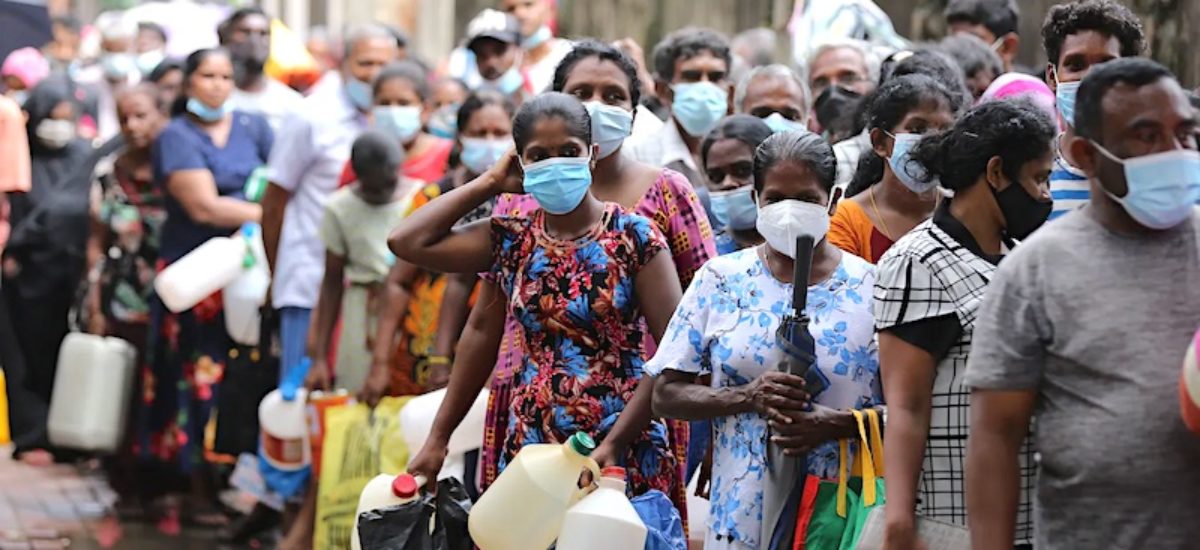Photo courtesy of The Conversation
An unprecedented economic crisis has shaken Sri Lanka with the price of essential goods and fuel rising rapidly and electricity shortages continuing to operate throughout the country. The political situation and crisis is ongoing and evolving constantly and each day brings a new angle and dimension to it. This article analyzes three areas pertaining to the current political situation: its economic dimension, the people’s protests and the Wickremesinghe presidency.
The COVID-19 pandemic struck Sri Lanka in 2019 denting its economic fortunes. The pandemic stalled tourism and generated a series of lockdowns that severely affected the economy. This dramatically reduced its foreign exchange reserves and made it difficult for the nation to stay afloat and manage its economy. Coupled with this was the country’s foreign debt problem, which had been in the making for a couple of decades at least. Sri Lanka has engaged in unsustainable debt practices from commercial lenders to bilateral partners such as China and India at commercial rates. It is unclear to the ordinary citizens of the country how this debt is going to be serviced.
So what does this say about the economic situation in the country? Sri Lanka’s $81 billion economy is under severe pressure. Unemployment, in particular youth unemployment, is at a record high. Overall economic growth is low and inflation is rising rapidly. This results in increasing prices of food and essential medicines. Consumer prices rose nearly 19% in March 2022 from a year earlier. This is the highest rate for Asia, after a 15% jump in February 2022. This dire economic crisis, unprecedented in the nation’s history, has triggered a feeling of anger and resentment towards the incumbent government.
Sri Lankans are finding themselves in increasingly difficult living and social conditions. Since the start of March 2022, homes and companies have experienced daily power cuts that have been grueling and have had a significant impact on productivity and efficiency. There has also been a petrol and fuel shortage that continues even at present, with long lines of people queuing up outside petrol stations to acquire a supply of fuel.
The street protests that have developed during this time have three broad dimensions. First, it is important to understand that the bulk of the protestors comprise the youth. These youth, many of whom are struggling with unemployment, are having their future hopes and aspirations dashed by the impact of the crisis. The protestors are managing to maintain momentum. The current political situation is therefore highly volatile and dangerous, with the possibility of increasing bloody clashes between protestors and the security forces.
The second dimension is the media. Media coverage and portrayal of the waves of protests have been largely sympathetic to the protestors. Most media (both local and international) have supported the protest movement by granting it widespread coverage and turning it into a global phenomenon. In fact Sri Lanka is now becoming a focal point throughout the world for protest movements, fueled largely by economic issues.
The third dimension is the Wickremsinghe presidency. Ranil Wickremesinghe may have attained his dream of becoming president of Sri Lanka and of course congratulations are in order. However, a word of caution is also in order. President Wickremesinghe inherits an almost impossible job at an impossible time. His core focus must be the correction of the economic mess focusing in particular on eliminating fuel shortages, curtailing inflation and introducing an immediate and sensible plan to restructure the international debt. If he does this and manages this equilibrium cleverly, he has an opportunity to go down in Sri Lankan history as a very successful leader at a time of urgent national need.
In conclusion, the political situation is very concerning indeed. In a nutshell the scenario can be summarized as an economic calamity coupled with acute political disorder and division. There is no clear answer to these difficult questions and each minute the crisis evolves. Whatever happens in the end, it is clear that every citizen will be grappling with very difficult political questions throughout the days, weeks and months to come.
The writer be contacted at [email protected]. This article has also been published in Ceylon Today.


